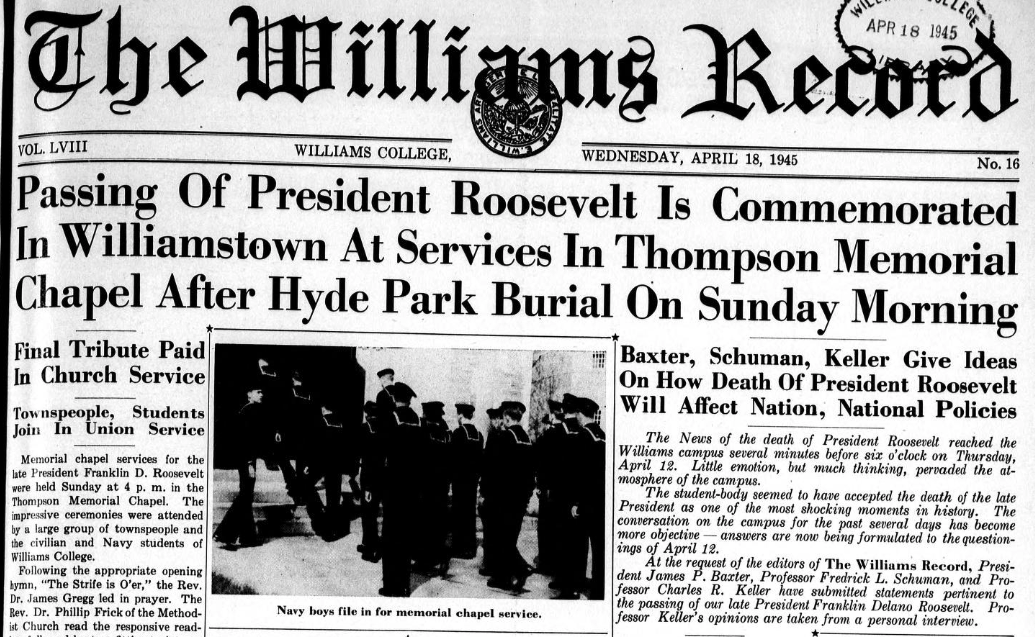Historical Ephvents: Record covers American involvement in WWII
April 19, 2023

Since its founding in 1887, the Record has reported on events of local and international significance. The Record column “Historical Ephvents” explores the paper’s coverage of historical events and their effects on campus. This week, it details the period following the attack on Pearl Harbor until the end of the Second World War.
July 31, 1942: College president leaves campus for the Office of Strategic Services
On July 31, 1942, the Record reported that James Phinney Baxter III, Class of 1914 and the College’s president at the time, extended his leave of absence from the College to travel to Britain in his capacity as a deputy coordinator for the U.S. Office of Strategic Services. The nature of his trip was under strict censorship, but the Record speculated that it “may be governed by President Franklin Roosevelt’s military order of June 1942, which stated that the Office of Strategic Services, under Colonel William J. Donovan, was authorized to ‘collect and analyze such strategic information as may be required by the Joint Chiefs of Staff,’ and to ‘plan and operate such special services as may be directed by the United States Joint Chiefs of Staff.’”
August 14, 1942: Professors telegram the White House regarding the colonization of India
In response to unrest in the subcontinent, Professors Max Lerner and Frederick Schuman argued in a telegram to Roosevelt that India, which was colonized by the United Kingdom, should have been able to “choose a form of government under which they will live,” the Record reported. There is no evidence of the telegram’s effect.
December 18, 1942: Enlisted former student loses his ambulance keys
Ambulance driver Richard Ragle ’45, who enlisted in the military in lieu of continuing his studies, captured seven German soldiers in the Libyan Desert alongside his partner, Henry Pierce. After the Americans fed the starved and wounded German soldiers lunch, Ragle realized that he had lost the keys to his ambulance. Pierce wrote to the Record that he had hidden the keys to prevent the Germans from “making [him] drive off” back to the German front lines, only to then forget where he had left them. They were eventually found with the Germans’ help, Ragle said.
February 26, 1943: Former professor writes German propaganda in Berlin
The Record reported that Otto Lessing, formerly a professor of German, now worked at the Berlin Propaganda Ministry. While one faculty member said that “[Lessing] didn’t seem like the type of person to get into this trouble,” the Record described him as a “roguish, poetic sort of individual” and detailed the marital and legal troubles that led him to flee the United States for Germany in 1928.
April 18, 1945: College community mourns death of Roosevelt
Six days after the death of President Roosevelt, the Record wrote: “The student-body seemed to have accepted the death of the late President as one of the most shocking moments in history.” The death of Roosevelt is the only event from the war — aside from the attack on Pearl Harbor — that the Record placed on its front page. The College held a memorial service for the late president in Thompson Memorial Chapel on April 15 following his burial in Hyde Park, N.Y., that morning.
August 17, 1945: Peacetime returns to the College
Eight days after the bombing of Nagasaki, the August 17, 1945, edition of the Record declared itself “the first ‘peacetime’ Record in four years.” “The dancing in the streets, the bonfires at the corner of Spring and Main [Streets], [and] the joyous cheering throughout Williamstown was still remembered as the student body returned to classes,” a front-page article reported. Amid the celebration, the Record also struck a tone of caution, noting the American agitation toward “that bogeyman, Communism.” The first peacetime Record article ended with a question: “The indications of what our world will be are all about us. Can we choose the right ones and then implement them?”








